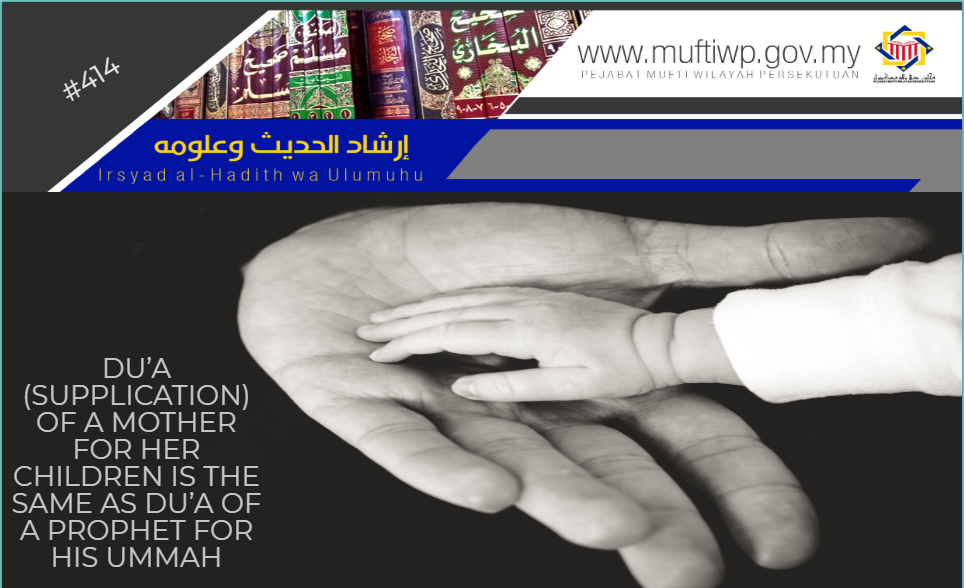Question:
Is it true that some speakers in masjid told that there is a hadith which states that a du’a of a mother for her children is of the same position as du’a of a prophet for his ummah?
Answer:
Alhamdulillah, praise and thanks to Allah for the countless blessings He has blessed us all with. Blessings and salutations to the Prophet Muhammad PBUH, his wives, his family, companions and all those that follow his teachings to the day of judgement.
Du’a is the weapon of the believers and it is indeed a special act of worship as it links a servant to his Creator, Allah SWT DIRECTLY. We as believers shall always make du’a because a man is full of weaknesses and always in need of his Creator at all times and places. Allah SWT also calls for His creations to seek for Him by making du’a as stated in the Quran:
وَقَالَ رَبُّكُمُ ادْعُونِي أَسْتَجِبْ لَكُمْ
And your Lord says, "Call upon Me; I will respond to you.
Surah Ghafir (60)
Moreover, children are valuable assets for parents. They are the adornment of this worldly life. This is based on a Quranic verse that says:
الْمَالُ وَالْبَنُونَ زِينَةُ الْحَيَاةِ الدُّنْيَا
Wealth and children are [but] adornment of the worldly life.
Surah al-Kahf (46)
Referring to the above question, we would like to present first the hadith meant which is that a du’a of a mother for her children is of the same position as du’a of a prophet for his ummah:
Narrated from Anas bin Malik RA, it is said that the Prophet PBUH said:
دُعَاءُ الْوَالِدِ لِوَلَدِهِ مِثْلُ دُعَاءِ النَّبِيِّ لأُمَّتِهِ
Du’a of a mother for her children is the same as du’a of a Prophet for his ummah
The following are the scholars who analyze the statement along with their commentaries:
- Imam Ahmad bin Hanbal (241 h) said that this hadith is bathil and munkar. [Refer: al-Mawdhu’at, 3/87]
- Imam Ibn al-Jauzi (597 h) views this hadith as fabricated. [Refer: al-Mawdhu’at, 3/87]
- Imam al-Suyuthi (911 h) states that this hadith is fabricated. [Refer: al-La’aaliy al-Masnu’ah, 2/250].
- Imam Ibn ‘Arraq al-Kinaniy (963 h) states that this hadith is fabricated. [Refer: Tanzih al-Syari’ah al-Marfu’ah, 2/282]
- Imam al-Fattani (986 h) also views this hadith as fabricated. [Refer: Tazkirah al-Mawdhu’at, 1/202]
According to the opinions of the scholars, we are of the view that the stated hadith is not authentic or fabricated saying of the Prophet PBUH. Hence, we should never ever claim it as a saying of the Prophet PBUH, nor spread it to the people, unless it is done to highlight and unveil the fabrication. The reason is, there is a serious warning for those who tells a lie against the Prophet PBUH where the Hellfire is waiting for those who do so. The Prophet PBUH said:
لاَ تَكْذِبُوا عَلَىَّ، فَإِنَّهُ مَنْ كَذَبَ عَلَىَّ فَلْيَلِجِ النَّارَ
"Do not tell a lie against me for whoever tells a lie against me (intentionally) then he will surely enter the Hell-fire."
Sahih al-Bukhari (106) and Sahih Muslim (1)
Nevertheless, the du’a of parents for their children is a form of du’a which is accepted or granted. This is in accordance with a hadith narrated by Imam Ibn Majah:
ثَلاَثُ دَعَوَاتٍ يُسْتَجَابُ لَهُنَّ لاَ شَكَّ فِيهِنَّ دَعْوَةُ الْمَظْلُومِ وَدَعْوَةُ الْمُسَافِرِ وَدَعْوَةُ الْوَالِدِ لِوَلَدِهِ
"There are three supplications that will undoubtedly be answered: the supplication of one who has been wronged; the supplication of the traveler; and the supplication of a father for his child."
Sunan Ibn Majah (3862) [Syeikh Syu’aib al-Arna’outh categorize this hadith as hasan li ghairihi]
Duties and Responsibilities of a Believer
As a believer who upholds love towards the Prophet PBUH, we should always preserve his name and stature; his dignity and his honor from any accusation and fabrication by others. This is the symbol of our love towards him as stated in his PBUH saying:
لاَ يُؤْمِنُ أَحَدُكُمْ حَتَّى أَكُونَ أَحَبَّ إِلَيْهِ مِنْ وَالِدِهِ وَوَلَدِهِ وَالنَّاسِ أَجْمَعِينَ
"None of you will have faith till he loves me more than his father, his children and all mankind."
Sahih al-Bukhari (15)
Meanwhile, it is also part of our obligations before we read, write, teach or convey any hadith of the Prophet PBUH to the public to verify them first as well as seek for its source and status. The reason is, if we claim something as the saying of the Prophet PBUH where it is all a lie, then it is feared to be included in this warning. By doing this, it is a way to preserve the sanctity of the religion as well as shielding it from those who intend to break it.
Conclusion
To conclude, among the signs of Allah’s mercy and gracefulness upon us is when He bestow some supplications that are mustajab for us. Hence, it is our responsibility to supplicate more. Lastly, may Allah SWT group us among His servants whom supplications are always accepted and may Allah always protect our tongue from telling lies against the Prophet PBUH. Ameen.


